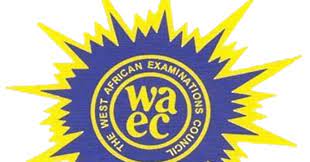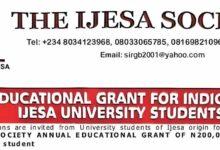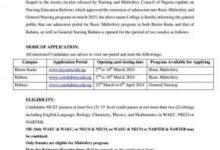
WAEC Syllabus for Business Management
WAEC Syllabus for Business Management. WAEC Syllabus for Business Management is available for all candidates who want to participate in the examination. The West African examination council (WAEC) has officially introduced a syllabus that will guide all the WAEC candidates who wish to write the WAEC examination this year. For a very successful WAEC Business Management examination for this year, you need to check out the available areas of concentration. It has been divided into sections with chapters, followed by the topics to be covered in preparation for the exams. In the WAEC Syllabus for Business Management, you will also see the format of how the WAEC Business Management questions will be presented. Jamb form
There are 2 sections to answer questions from. Paper 1 is Objective and paper 2 contains essay questions. Where paper one (1) carries 30 marks for 1 hour; paper two (2) carries 70 marks.
👉 Relocate to Canada Today!
Live, Study and Work in Canada. No Payment is Required! Hurry Now click here to Apply >> Immigrate to Canada
This WAEC syllabus is for both the O’level WAEC and General Certificate Examination (GCE) candidates. Final year students in the senior secondary school level and external candidates are eligible to make use of this syllabus and prepare ahead of the examination. WAEC Syllabus for Business Management
See the full detailed information concerning the WAEC Business Management Syllabus below.
Read Also: WAEC Syllabus for Biology
PREAMBLE
The course in Business Management at the senior school level embraces principles and activities in the core functional areas of business management. It also covers legal environment of business, information technology, globalization, economic integration and entrepreneurship.
AIMS
The examination, therefore, intends to test candidates’
(i) understanding and appreciation of the basic concepts, principles and practices of business management;
(ii) understanding of the role of business management in an economy;
👉 Relocate to Canada Today!
Live, Study and Work in Canada. No Payment is Required! Hurry Now click here to Apply >> Immigrate to Canada(iii) ability to relate the concepts and principles of business management to practical business situations.
(iv) ability to pursue further studies in business management.
Read Also: WAEC Syllabus for Agricultural Science
SCHEME OF EXAMINATION
There will be two papers, Paper 1 and Paper 2; both of which will constitute a composite paper and will be taken at a sitting.
PAPER: 1 This will consist of fifty compulsory multiple-choice objective questions which will cover the entire syllabus and will carry 30 marks. It will last1 hour.
PAPER: 2 It will consist of a compulsory case study question and seven other essay questions, out of which candidates will be expected to answer any three. The case study will range between 200 and 250 words and will carry 25 marks, while the other questions will carry equal marks of 15 each. The paper will therefore carry a total of 70 marks. Dollar to Naira Rate
DETAILED SYLLABUS
| TOPICS | NOTES |
| 1. NATURE OF
MANAGEMENT
1.1 Meaning and Process of Management
1.2 Forms of Business Organization
1.3 Business and Society
2. FUNCTIONS OF MANAGEMENT
2.1 Planning and Decision Making
|
1.1.1 Meaning of Management and administration 1.1.2 Basic Functions of Management 1.1.3 Levels of Management 1.1.4 Types and Roles of Managers 1.1.5 Difference between Administration and Management 1.2.1 Meaning of Business Organization 1.2.2. Identification of Major Forms: (Sole Proprietorship, Partnership, (Sole Proprietorship, Limited Liability Company, Public orations, Co-operative society) Co-operative society) Company, Public orations, Co-operative society) 1.2.3. Procedures for the formations/Characteristics, advantages and disadvantages of each form. 1.2.4 Causes of business failure.
1.3.1 Meaning of Business Environment Business Environment, Business Environment, Environment Business Environment, 1.3.2 Forces in the Businesses Environment Environment 1.3.3 Ethical, legal and social responsibilities of Businesses. responsibilities of Businesses. 1.3.4 Primary and Secondary stakeholders – meaning and differences. 1.3.5 Responsibilities of businesses towards
2.1.1 Meaning and importance of planning of planning 2.1.2 Steps in planning, Types of planning, Limitations to planning .2.1.3 Meaning and of planning, Limitations to planning 2.1.3 Meaning and importance of decision making. importance of decision making. planning importance of decision making. stakeholders. businesses towards stakeholders. 1. |
Read Also: WAEC Syllabus for Business Management
| TOPICS | NOTES |
|
2.2 Organizing
2.3 Directing
2.4 Controlling |
2.1.4 Step in the decision making process.
2.1.5 Types of (Programmed and Non- programmed) decisions. Non-programmed) decisions. making process. 2.1.5 Types of (Programmed and Non-programmed) decisions. 2.1.6 Levels of management decisions.
2.2.1 Meaning, importance and activities of organizing 2.2.2 Principles of organizing, Organizational structure and Organizational chart 2.2.3 Centralization and decentralization- meaning differences, advantages and disadvantages. 2.2.4 Meaning and benefits of delegation. 2.2.5 Reasons why managers do not delegate 2.2.6 Reasons why subordinates do not accept Delegation 2.2.7 Guidelines for delegation
2.3.1 Meaning and elements of directing 2.3.2 Motivation – meaning, intrinsic and extrinsic factors 2.3.3 Maslow’s Hierarchy of Needs. 2.3.4 Leadership importance of good leadership. 2.3.5 Leadership styles and Sources of power available to leaders. 2.3.6 Communication –meaning, importance, channel formal and informal 2.3.7 The Communication process 2.3.8 Barriers to communication 2.3.9 Guidelines to effective communication
2.4.1 Meaning and reasons for controlling 2.4.2 Steps in controlling. 2.4.3 Tools for controlling
|
| TOPICS | NOTES |
| 3. MANAGEMENT
INFORMATION TECHNOLOGY
4. LEGAL ENVIRONMENT OF BUSINESS 4.1 Law of Contract
4.2 Principles of Agency
4.3 Negotiable Instruments
5. FINANCE AND FINANCIAL INSTITUTIONS 5.1 Money
5.2 Banking |
3.1 Concept of ICT
3.2 Data and information, meaning, differences; and sources of business information 3.3 Functions of the computer 3.4 Applications of computers in Business 3.5 Advantages and challenges of the use of Computers in business
4.1.1. Meaning and elements of contract 4.1.2 Classification of contracts 4.1.3 Vitiating factors (Void and Voidable contracts) 4.1.4 Ways of discharging a contract
4.2.1 Creation of agency 4.2.2 Rights and duties of a principal 4.2.3 Rights and duties of an agent 4.2.4 Termination of agency
4.3.1 Meaning and characteristics of negotiable instruments 4.3.2 Types of negotiable instruments (Cheques; Bills of exchange; Promissory notes) 4.3.3 Cheques: Class, types, advantages, disadvantages and ways of avoiding cheque frauds.
5.1.1 Meaning and characteristics of money characteristics of money 5.1.2 Functions of money 5.1.3 Meaning and causes of inflation
5.2.1 Types of banks 5.2.2 Functions of the Central bank 5.2.3 Functions of commercial and other types of banks 5.2.4 Types of bank accounts. 5.2.5 Tools of monetary control
|
| TOPICS | NOTES |
| 5.3 Risk Management
and Insurance
5.4 Stock Exchange
6. ROLE OF GOVERNMENT IN THE ECONOMY
7. INTERNATIONAL TRADAND PROBLEMS OF DEVELOPING ECONOMIES 7.1 International Trade |
5.3.1 Meaning of risk and risk management
5.3.2 Types of business risks 5.3.3 Meaning and importance of insurance 5.3.4 Principles of insurance 5.3.5 Types of insurance and insurance Policies
5.4.1 Meaning and functions 5.4.2 Types of securities
6.1 Role of government in an economy 6.2 Sources and types of government revenue 6.3 Purpose of taxation 6.4 Types of taxes and challenges of tax collection 6.5 Types and items of government Expenditure
7.1.1 Meaning of trade 7.1.2 Difference between domestic and international trade 7.1.3 Documents used in domestic and international trade 7.1.4 Reasons for international trade 7.1.5 Theories of absolute cost and comparative cost advantage 7.1.6 Restrictions in International trade Balance of Payments (BOP) and measures for correcting BOP deficit
|
Read Also: WAEC Syllabus for Book Keeping
| TOPICS | NOTES |
| 7.2 Developing Economies
8. GLOBALIZATION AND ECONOMIC INTEGRATION 8.1 Globalization
8.2 Economic integration
9. FUNCTIONAL MANAGEMENT 9.1 Elements of Human Resource Management |
7.2.1 Challenges of developing economies
in relation to International trade 7.2.2 Ways of improving Developing Economies by Government 7.2.3 Role of the following institutions in international trade : International Monetary Fund (IMF), International Bank for Reconstruction and Development (IBRD), United Nations Conference on Trade and Development (UNCTAD).
8.1.1 Meaning and causes of globalization 8.1.2 Advantages and disadvantages of Globalization
8.2.1 Meaning of economic integration 8.2.2 Roles of the following in economic integration : Economic Community of West African States (ECOWAS), African Union (AU), European Union (EU), P African European Pacific Countries Association of South and Eastern Asian Nations (ASEAN).
9.1.1 Meaning of human resource Management 9.1.2 Functions of human resource management 9.1.3 Steps in the recruitment and selection process 9.1.4 Sources of recruitment 9.1.5 Types of training; 9.1.6 Job Analysis (job description and job specification) 9.1.6 Performance appraisal – meaning and importance |
| TOPICS | NOTES |
| 9.2 Labour Relations
9.3 Fundamentals of Production Management
9.4 Principles of Marketing |
9.2.1 Meaning of labour relations, Trade
Unions and industrial relations. 9.2.2 Functions of Trade Unions 9.2.3 Employers’ Association: Meaning and functions. 9.2.4 Collective bargaining-process importance and rights of parties involved.
9.3.1 Meaning of production and production Management. 9.3.2 Forms of Production – extractive, manufacturing, construction, commercial and personal services 9.3.3 Factors of production 9.3.4 Meaning of specialization and exchange 9.3.5 Advantages and disadvantages of specialization 9.3.6 Types of production process – job, batch, flow 9.3.7 Steps in production planning and Control
9.4.1 Meaning of Marketing: Meaning and activities. 9.4.2 Market segmentation: Meaning and bases. 9.4.3 Elements of the marketing mix (product, price,promotion and place) 9.4.4 Steps in new product development 9.4.5 Stages of product life cycle (introduction, growth, maturity and decline) 9.4.6 Functions of packaging and uses of branding 9.4.7 Factors affecting pricing and pricing objectives 9.4.8 Promotion: Meaning, importance and types 9.4.9 Channels of distribution 9.4.10 Functions of wholesalers and retailers |
| TOPICS | NOTES |
| 9.5 Electronic Commerce
(e -Commerce)
9.6 Business Finance
10. ENTREPRENEURSHIP AND SMALL BUSINESS 10.1 Entrepreneurship
10.2 Small Business |
9.5.1 e-commerce: Meaning and
importance. 9.5.2 Meaning of Business Finance.
9.6.1 Short-term and long-term sources of finance 9.6.2 Government lending programmes; Venture capital fund
10.1.1 Meaning of entrepreneurship 10.1.2 Role of entrepreneurs 10.1.3 Characteristics of an entrepreneur 10.1.4 Content of business plan 10.1.5 Reasons for business successes and failures 10.1.6 Record Keeping: Meaning, importance and types. 10.1.7 Time Management: Meaning, importance and techniques.
10.2.1 Small businesses: Meaning and categories 10.2.2 Procedures in the formation of small businesses 10.2.3 Importance of small businesses in the economy 10.2.4 Challenges of small businesses 10.2.5 Role of government in promoting small businesses 10.2.6 Ways of sustaining an established business
|
SUGGESTED READING LIST
NAME PUBLISHER TITLE
Ansah, J.K. Wilas Press Ltd Introduction to
Business Management
Attieku, B, Marfo-Yiadom, E Smartline Limited Business
Dorkey, T and Tekyi, K. Management
Boachie-Mensah, F.O Woeli Publishing Essentials of
Services Management
Browne, D., Barass, M., Heinemann Education Business
W., Dransfield, R and Publishers Studies
Needham D. for AS Level
Buckley, M. Brindley, B
and Greenwood, M.S, Longman Group Business Studies
Callaghan, P (ed). Sunderhid Tyre and Business
Wear Advanced Level
Carysforth, C and Neild, M Heinemann Education Intermediat
Publishers Business
Danks, S. DP Publication Advanced Business
Studies
Du Toit, G S, Erasmus, B G, Oxford University Introduction to
and Strydom, J W, Press South Africa Business
Management
Fardon, M. (ed) Osborne Books Business Studies,
Limited
Needham, D. and Dransfield, R Stanley Thornes Business Studies,
NAME PUBLISHER TITLE
Needle, D International Thomson Business in
Business Press Context
Nickels, W.G McHugh, Irwin McGraw-Hill Understanding
J.M And McHugh, S.M. Business
Marfo-Yiadom, E Excellent Printing & Introduction to
Publishing Business
Redmond, PWD Pitman Publishing Ltd Mercantile Law
Check and Confirm: How much is Dollar to Naira







